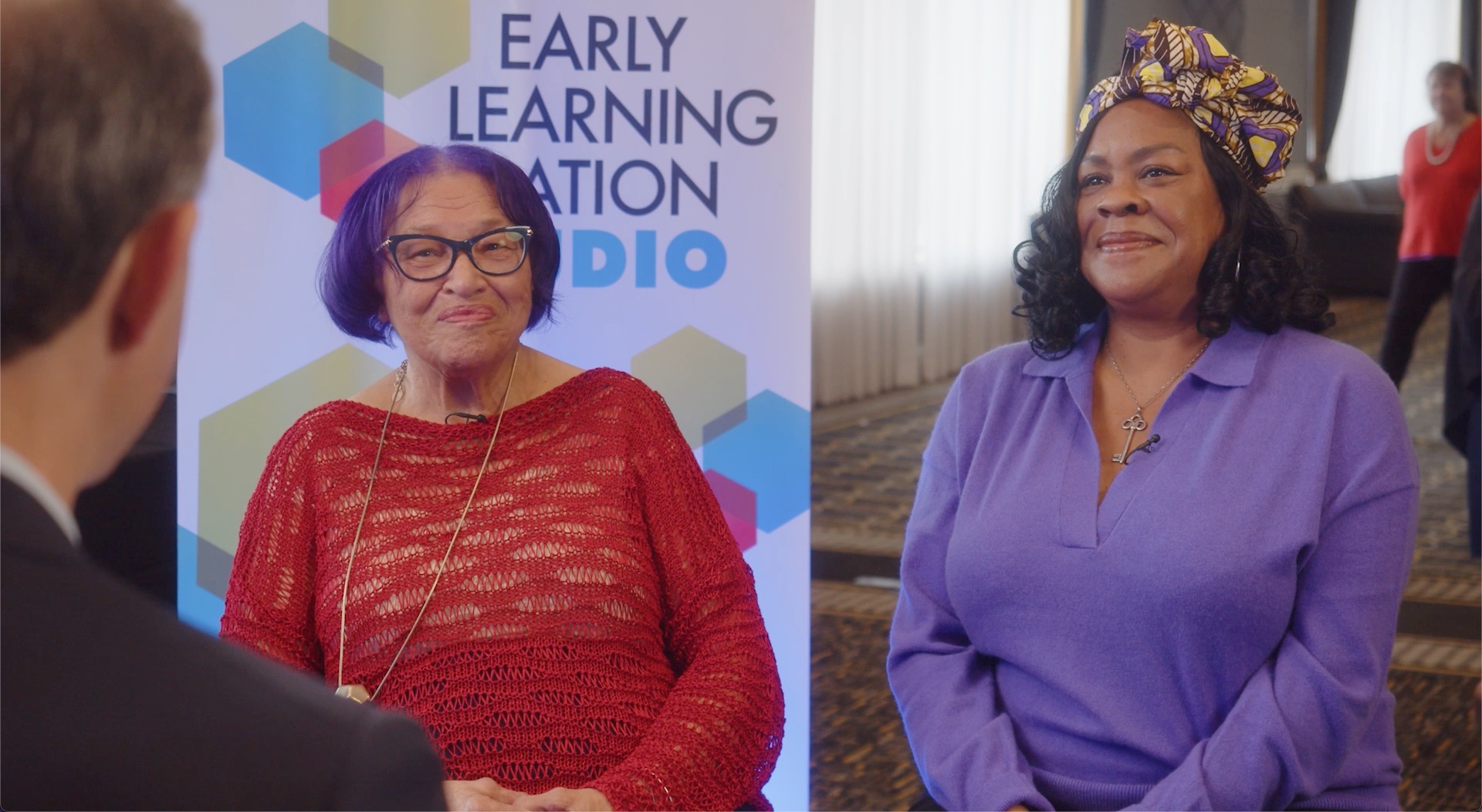Editor’s Note: The Early Learning Nation Studio recently attended the 2023 National Black Child Development Institute’s annual conference in Charlotte, NC. We had rich and illuminating conversations with early learning researchers, policymakers, advocates and practitioners of all ages. The full collection of video conversations can be found here.
From BCDI-Greater Los Angeles comes an ageless African tradition: Mind your elders. After all, from lessons on wisdom to respect, they have important insights for parents and children alike.
Chris Riback: Schellee, Valeria, thank you both so much for coming by the studio.
Schellee Rocher: You’re welcome.
Valeria Norwood: Thanks for having us.
Chris Riback: So let’s start with BCDI Los Angeles. Tell me what’s going on with it. What’s the community like? What are some of the areas that you’re really focusing on there?
Schellee Rocher: So, I’m Schellee Rocher. I am the village President for the greater BCDI Greater Los Angeles.
Chris Riback: Greater Los Angeles.
Schellee Rocher: Right. We did change the name from just Los Angeles to make sure that we could include The Los Angeles County, which is the size of the state of Delaware, so can I let Valeria introduce herself a little bit too?
Chris Riback: Of course. Valeria, tell me about you.
Valeria Norwood: Well, I’m Valeria Norwood. I’ve been a BCDI member for a few years, and I enjoy this work. I know that I am probably, so I’m told, aging. I am a member of the Council of Elders that we now have, and that Council of Elders comes from our African tradition, where there was a group of elders that always could oversee or could make recommendations, and they were supposed to have wisdom. Now, I won’t go that far, but it’s a great group. We support our national office and the board, and so we’re just here to help. Most of us have been in this field of education, some with early education, some with middle school, and even to high school because we have had some of those programs too.
Chris Riback: And you used to run, if I’m not mistaken, BCDI Los Angeles.
Valeria Norwood: Well, I wasn’t president for a while. I don’t know if I-
Chris Riback: You’re very vague on the actual numbers, I noticed.
Valeria Norwood: I don’t know if I would say I run, but every child that’s Black belongs to me. And it is my privilege to do something to help that child become the best that he or she may. And that while they’re doing that, you support their parents, but you want them to have health, education, a safe place to live, to go to the park to play. So, that’s what you strive for. And sometimes now that is not so easy, but just because it isn’t easy doesn’t mean that it cannot be done. And so, that’s why I still do this.
Chris Riback: What a beautiful and powerful statement that every child is yours.
Valeria Norwood: Yes.
Chris Riback: Schellee, as I’m listening to Valeria and listening to her role on the Council of Elders, you’re working every day with parents and children, with the next generations. What’s the role of elders in the work that you do?
Schellee Rocher: So well, currently there’s not a large role, but that’s something that we want to change moving forward. With BCDI Greater Los Angeles, our goal is to, right now, the vision that I have is to develop a network of schools and childcare programs that already exist to become part of the BCDI Greater Los Angeles network. And so, the privilege that they’ll get from being a part of our network is to be exposed to elders, have the national programs implemented, and any programs that we decide to develop at the local level but the elders would be a part of that.
Chris Riback: And why is that important? Why does it matter for kids today to have access to elders like that?
Schellee Rocher: Well, as she said, it’s an African tradition for us and for children to… The elders bring so much, the children learn from them, a lot of lessons, a lot of wisdom, a lot of respect, and it carries on through the community. Community is a big part of having elders engaged and involved, and a lot of children unfortunately, don’t have that. So, having extra elders and extra aunts and uncles and grandparents can really, I think help us get back on track with our communities and our children.
Chris Riback: Schellee, Valeria, thank you both for everything that you do. Thank you for coming by the studio.
Schellee Rocher: Thank you for having us.



